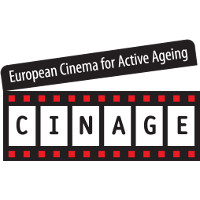CINAGE: Cinema for Active Ageing

Cinema for Active Ageing course enables staff or volunteers working in the field of adult and later life learning from any public or private organisation to became familiar with the training methodology and tools that will allow older learners to shoot their own films about active ageing based on their self-reflection concerning the issues of old age and identification of adequate active ageing strategies.
Decreasing fertility rates and rising life expectancy have created drastic demographic changes in Europe. The ageing population can be seen as a success of public health policies and socio-economic development, but it also challenges society to develop the health and well-being of older people as well as ensuring their security and social participation.
Active Ageing allows people to realize their potential for physical, social and mental well-being throughout their lives and to participate actively in society, whilst providing them with adequate protection, security and care, all leading to an extended, and healthy, life expectancy.
Older people is being encouraged to acquire new skills and participate in society. Active engagement in cognitively stimulating activities is associated with reinforced memory function, decreased depression and increased life satisfaction.
The course includes 4 Topic and a cinema atelier for the production of the short movie.
The course is designed to staff or volunteers working in the field of adult and later life learning from any public or private organisation and which develop their work directly with the older. CINAGE course aims to promote Active Ageing that will allow older people to realize their potential for physical, social and mental well-being throughout their lives and to participate actively in society, whilst providing them with adequate protection, security and care, all leading to an extended, and healthy, life expectancy.
The main objective of the course is to prepare participants to be able to use cinema as a mean for offering exciting training activities for later life learners.
By the end of the course participants will have a comprehensive understanding of the potential use and exploitation of the CINAGE package, which includes:
- Manual for Learners with information on the 6 training modules developed during the project;
- Guide for facilitators/trainers with tips on how to implement the proposed activities;
- Executive summaries on active ageing research and pilot actions already developed;
- List of the selected 6 European films demonstrating active ageing themes/competencies and supporting fact sheets;
- 12 CINAGE short films as DVD Pal including supporting fact sheets;
- 12 situations and strategies to cope with active ageing.
AidLearn will send to each participant, as soon as he/she is formally registered to the training course, information regarding the site of the training course: how to get there, interesting touristic places to visit, lodging and food, and some Portuguese culture and language tips.
Each participant will prepare a slideshow presentation (PowerPoint or other) to introduce his/her organisation to others and what are the expectative to the training course. This presentation should be sent to AidLearn one week before the training starts.
The Course will introduce the participants to two topics: active ageing, what needs to be done and learned in order to age actively, and production of short featured films. Both topics and related activities can be successfully integrated in older adult or/and intergenerational education. Writing scripts and producing short featured films are highly appreciated not only by adult educators but also by older learners and adult education providers.
Activities will include presentation of the educational material, sessions on topics such as active ageing and andragogy, screening and debating a variety of short and feature films as well as a cinema atelier for the production of new short films, which will be organized in collaboration with elder local participants.
There will be study visits to places of interest, such as media museum or film studios.
The training course finishes with an evaluation questionnaire regarding the training course and organization. It is created a mailing list with all the participants: learners, trainers and coordinator, and they are encouraged to communicate with each other regarding the professional practice of what they learnt.
The participants are invited to join the AidLearn Facebook page dedicated to the training, so it is possible to everybody maintain contact with the group and with other participants in AidLearn training courses.
- Day 1
-
- Arrival of the participants and welcoming session
- Day 2
-
- Topic 1 - Introduction to the CINAGE Course, Package and Active Ageing
- Day 3
-
- Topic 2 - European Cinema and Active Ageing
- Day 4
-
- Topic 3 - Developing Life Stories and Strategies for Active Ageing
- Day 5-6
-
- Topic 4 - Turning Life Stories into Screenplays
- Day 7-8
-
- Organised study visits and/or free time
- Day 9-13
-
- Topic 5 - Filmmaking - Cinema atelier (production of the short movie)
- Day 14
-
- Departure of participants
- Course fee (10 days): 700€
- Amount which includes preparation for the course, tuition, training materials, administration costs, AidLearn organizational costs.
- Course Package (14 nights – single room): 2.040€
- Course Package, which includes course fees (as above), lodging in single room for 14 nights with breakfast, lunches, visits, social dinner and farewell dinner, per person.
- Course Package (14 nights – double room): 1.900€
- Course Package which includes course fees (as above), lodging in a shared double room for 14 nights with breakfast, lunches, visits, social dinner and farewell dinner, per person.





